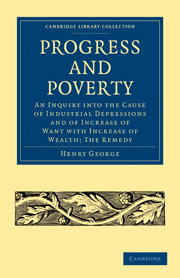 Progress and Poverty
Progress and Poverty Book contents
- Frontmatter
- PREFACE TO FOURTH EDITION
- Contents
- INTRODUCTORY
- BOOK I WAGES AND CAPITAL
- BOOK II POPULATION AND SUBSISTENCE
- BOOK III THE LAWS OF DISTRIBUTION
- Chapter I The inquiry narrowed to the laws of distribution—necessary relation of these laws
- Chapter II Rent and the law of rent
- Chapter III Interest and the cause of interest
- Chapter IV Of spurious capital and of profits often mistaken for interest
- Chapter V The law of interest
- Chapter VI Wages and the law of wages
- Chapter VII Correlation and co-ordination of these laws
- Chapter VIII The statics of the problem thus explained
- BOOK IV EFFECT OF MATERIAL PROGRESS UPON THE DISTRIBUTION OF WEALTH
- BOOK V THE PROBLEM SOLVED
- BOOK VI THE REMEDY
- BOOK VII JUSTICE OF THE REMEDY
- BOOK VIII APPLICATION OF THE REMEDY
- BOOK IX EFFECTS OF THE REMEDY
- BOOK X THE LAW OF HUMAN PROGRESS
- CONCLUSION
- INDEX
Chapter III - Interest and the cause of interest
Published online by Cambridge University Press: 07 September 2011
- Frontmatter
- PREFACE TO FOURTH EDITION
- Contents
- INTRODUCTORY
- BOOK I WAGES AND CAPITAL
- BOOK II POPULATION AND SUBSISTENCE
- BOOK III THE LAWS OF DISTRIBUTION
- Chapter I The inquiry narrowed to the laws of distribution—necessary relation of these laws
- Chapter II Rent and the law of rent
- Chapter III Interest and the cause of interest
- Chapter IV Of spurious capital and of profits often mistaken for interest
- Chapter V The law of interest
- Chapter VI Wages and the law of wages
- Chapter VII Correlation and co-ordination of these laws
- Chapter VIII The statics of the problem thus explained
- BOOK IV EFFECT OF MATERIAL PROGRESS UPON THE DISTRIBUTION OF WEALTH
- BOOK V THE PROBLEM SOLVED
- BOOK VI THE REMEDY
- BOOK VII JUSTICE OF THE REMEDY
- BOOK VIII APPLICATION OF THE REMEDY
- BOOK IX EFFECTS OF THE REMEDY
- BOOK X THE LAW OF HUMAN PROGRESS
- CONCLUSION
- INDEX
Summary
Having made sure of the law of rent, we have obtained as its necessary corollary the law of wages, where the division is between rent and wages; and the law of wages and interest taken together, where the division is between the three factors. What proportion of the produce is taken as rent must determine what proportion is left for wages, if but land and labor are concerned; or to be divided between wages and interest, if capital joins in the production.
But without reference to this deduction, let us seek each of these laws separately and independently. If, when obtained in this way, we find that they correlate, our conclusions will have the highest certainty.
And, inasmuch as the discovery of the law of wages is the ultimate purpose of our inquiry, let us take up first the subject of interest.
I have already alluded to the difference in meaning between the terms profits and interest. It may be worth while, further, to say that interest, as an abstract term in the distribution of wealth, differs in meaning from the word as commonly used, in this: That it includes all returns for the use of capital, and not merely those that pass from borrower to lender; and that it excludes compensation for risk, which forms so great a part of what is commonly called interest. Compensation for risk is evidently only an equalization of return between different employments of capital.
- Type
- Chapter
- Information
- Progress and PovertyAn Inquiry into the Cause of Industrial Depressions and of Increase of Want with Increase of Wealth; The Remedy, pp. 155 - 169Publisher: Cambridge University PressPrint publication year: 2009First published in: 1881


